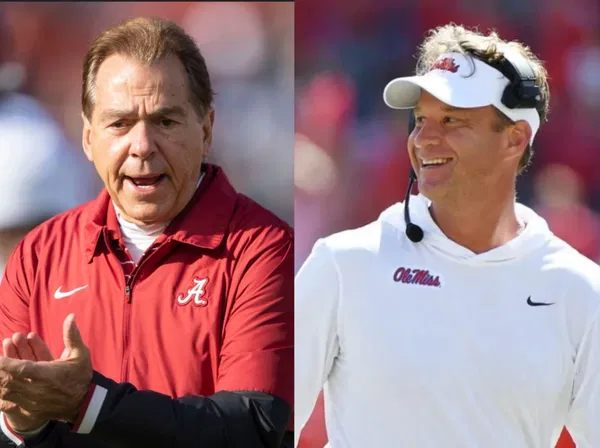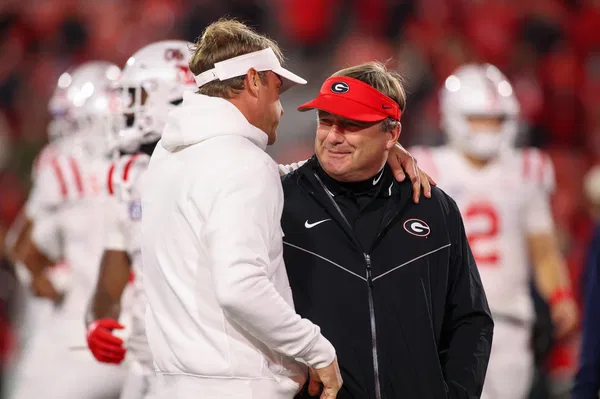
Alabama fans will always remember the glory of the 2015 national championship, when the team was led by the iconic coaching duo of Nick Saban and offensive coordinator Lane Kiffin. One of the most unforgettable moments from that title run was Kenyan Drake’s electrifying 95-yard kickoff return touchdown in the final game—a true symbol of the dominance of Saban’s Alabama teams. Now, with Saban retired from coaching, it seems that Lane Kiffin is eager to see him make a return.
Currently the head coach of Ole Miss, Kiffin has made impressive strides with a program that had not seen consistent top-tier finishes in decades. Under his leadership, the Rebels have posted strong seasons, including a 10-3 record last year and an 11-2 finish in a previous season. His progress suggests a continuation of the coaching principles he picked up under Saban. Still, despite his success, Kiffin seems to miss Saban’s presence in the game.
While speaking on Theo Von’s podcast, Kiffin speculated about the possibility of Saban making a return to coaching. He emphasized that Saban is the kind of person who thrives on constant activity and structure, not someone likely to settle into a quiet retirement. Kiffin even suggested that a return to the NFL wouldn’t surprise him, citing Saban’s deep passion and unparalleled skill for coaching.
Even though Saban stepped away from the sidelines, his love for football remains evident. He has stayed involved with the sport through his role as an analyst on ESPN’s College GameDay. There has also been some discussion about Saban possibly taking on a more administrative role in college football, such as overseeing operations or serving in a commissioner-like capacity.
Kiffin’s suggestion of an NFL comeback might seem far-fetched given Saban’s less-than-ideal stint with the Miami Dolphins, but his deep connection to the game could pull him back to the field in some capacity. Ultimately, for someone so driven by competition and structure, the energy of live football might be impossible to leave behind.
Kiffin also reflected on Saban’s outsized influence on college football, noting that his overwhelming success at Alabama may have stifled competition within the conference. He pointed out that Saban’s dominance led to Alabama securing top recruits, postseason spots, and even the best coaching talent, leaving other programs at a disadvantage. In Kiffin’s words, while Alabama’s success was great for the program, it might not have been ideal for a balanced and competitive SEC.

During his 17-year tenure at Alabama, Saban won six national championships and nine SEC titles. He consistently assembled top-ranked recruiting classes and built an elite coaching tree. Coaches such as Kirby Smart, Steve Sarkisian, Dan Lanning, Billy Napier, Mario Cristobal, Jeremy Pruitt, and Will Muschamp all worked under him before rising to prominence in their own careers.
If Saban were to return to college football, there’s a real chance the conference could once again become heavily one-sided, with one program dominating the rest—just as Alabama did under his leadership.
Kiffin also shared a personal anecdote that revealed Saban’s relentless competitiveness. He recalled an Easter visit to Saban’s house with his children, during which the legendary coach helped his young grandchild—barely one year old—find the coveted “golden egg” in an Easter egg hunt. Despite older children, including Kiffin’s, failing to locate it, Saban ensured his grandchild succeeded. This light-hearted story underscored Saban’s all-encompassing competitive nature, a trait that clearly extends beyond the football field.
Such stories illustrate why Saban became one of the greatest coaches in college football history. His obsession with excellence, intense drive to win, and commitment to high standards are what made him a legendary figure in the sport. Whether or not he returns to coaching, his legacy remains firmly entrenched in the fabric of college football.